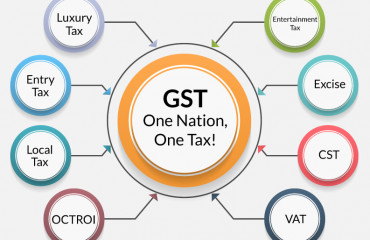
NEW DELHI : Goods and Services Tax (GST) revenue collection of central and state governments will continue to grow at a faster pace than nominal GDP growth rate till very high tax compliance level is achieved, after which, the tax on consumption will grow in sync with the rate of economic expansion, Central Board of Indirect Taxes & Customs (CBIC) chairman Sanjay Kumar Agarwal said in an interview.
NEW DELHI : Goods and Services Tax (GST) revenue collection of central and state governments will continue to grow at a faster pace than nominal GDP growth rate till very high tax compliance level is achieved, after which, the tax on consumption will grow in sync with the rate of economic expansion, Central Board of Indirect Taxes & Customs (CBIC) chairman Sanjay Kumar Agarwal said in an interview.
Agarwal said that the nominal GDP rate will be dictating growth in GST revenue although presently there is a tax buoyancy above 1, which indicates compliance level is going up. A host of measures taken to improve the efficiency of GST will ensure that there will be a huge jump in voluntary compliance by tax payers and that chances of or propensity to evade taxes will be less, he said.
"So in times to come, this buoyancy in GST revenue collection will continue, but slowly, when the compliance level will be very high, then the buoyancy will not be that high. Let's hope our GDP growth will be very robust and accordingly GST revenue collections will also happen," said Agarwal.
Tax buoyancy refers to the responsiveness of tax revenue to changes in economic activity and is a barometer of how well the tax system is able to mobilise additional revenue.
The official also said that GST return filing has now gone beyond 90% of registered persons in an indication of a high level of compliance.
Agarwal said that the interim budget for FY25 announced on Thursday has introduced a penalty of ₹1 lakh on producers of tobacco and pan masala on each of the machines that they do not register with the authorities as required under the law.
That was one of the recommendations of a ministerial group that looked into the tobacco sector. They recommended that there should be registration of packaging machines on GSTN portal and that if a producer does not register as per the regulations made in this regard, then there should be provision for imposing penalty.
That provision has now been brought into law. So in case of failure to take registration on common portal, there will be a penalty of ₹1 lakh per machine and the machine will be liable for confiscation in case they do not pay the penalty, explained Agarwal.
The registration requirement was introduced to make sure companies in the tobacco and pan masala industry, considered to be a tax evasion prone sector, do not under-report sales and try to evade taxes.
To a question on whether electric mobility gaining currency will impact Centre's excise duty collection from petrol and diesel, Agarwal said, "If people switch over to electric vehicle, there will be lesser consumption of these auto fuels but I don't see that happening in the near future. Maybe, after sometime, people may switch over to electric vehicles and there may be much lesser number of petrol or driven vehicles. (If so,) then that will impact the duty collection on petrol and diesel."
Agarwal said that alternative sources of tax revenue will evolve in the future, as usage of electric vehicles and batteries increases.
The dispute over taxation of online gaming is in the Supreme Court and recovery of alleged tax dues cannot happen now, he said.
The CBIC chairman also said that a selection committee of the central government and state level panels will recommend persons for appointment as technical and judicial members to the GST appellate tribunal.
Agarwal said there is likely to be a GST Council meeting in February. The agenda is yet to be finalized
